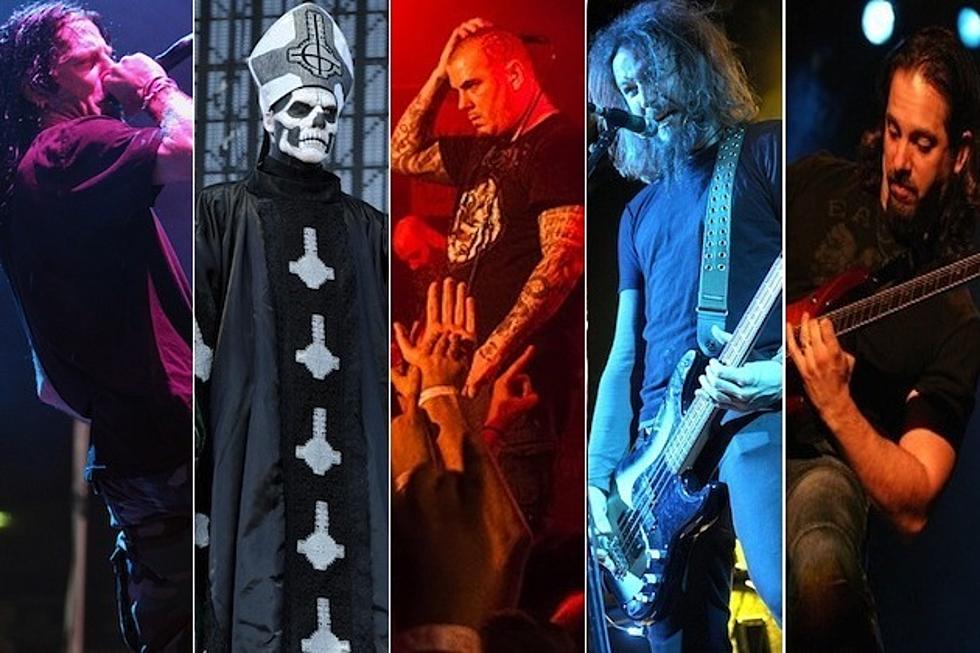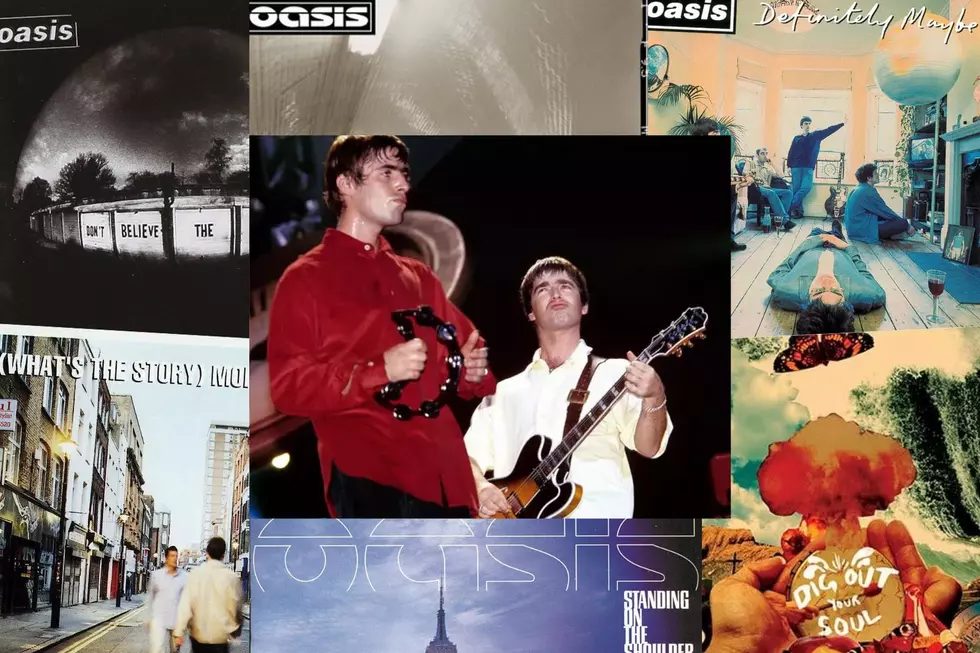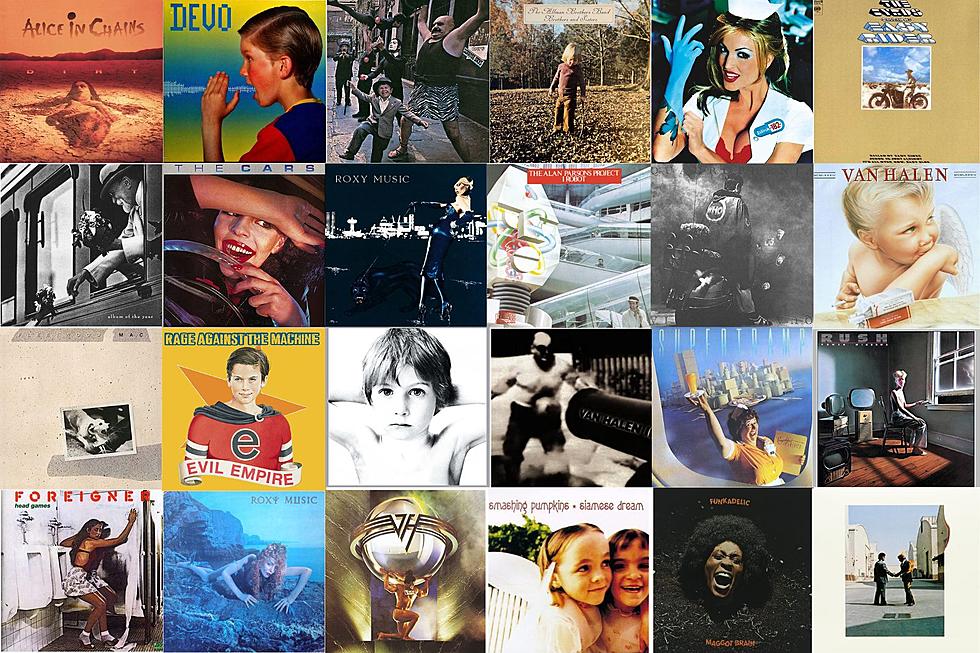
11 Modern Metal Bands That Are Destined for Classic Rock Greatness
If music history has taught us anything, it’s that many of today’s heavy metal stars will probably be tomorrow’s classic rock legends. Just think back 30 years, when Metallica couldn’t get a whiff of radio airplay despite filling concert halls around the country, and you’ll understand what we mean. So we asked ourselves which current heavy metal bands seem fated to make this transition and came up with the following alphabetical list of 11 Modern Metal Bands That Are Destined for Classic Rock Greatness. That’s right, this one goes to 11 - enjoy!
Avenged Sevenfold
We're going in alphabetical order here, but when we asked our buddies over at Loudwire who we should include on our list of the 11 Modern Metal Bands That Are Destined for Classic Rock Greatness, Avenged Sevenfold was the first name they mentioned. Obviously the group's 15 million plus Facebook fans would agree that their modern twist on the sounds pioneered by Black Sabbath and Iron Maiden have "A7X" lined up to take their own place in the rock pantheon.
Baroness
Rising from the unexpectedly fertile heavy metal breeding grounds of Savannah, Georgia, Baroness welded the post-metal ambitions of Neurosis to the serpentine progressive riffing of Mastodon, then threw in a third millennium indie rock sensibility to establish a cutting edge sound all their own. Each one of their conspicuously color-coded albums has seen the band evolve and shape-shift without fear, while maintaining a common thread in inventive but catchy heavy music that’s bound to serve them well in the long run.
Down
There’s little chance that Crowbar, Eyehategod or even Corrosion of Conformity will ever qualify as classic rock (and even Pantera had to break down the back door), but when assorted members of these bands assembled into Down, the resulting “underground supergroup” promptly succeeded in bringing southern sludge to the masses. And it didn’t hurt that Black Sabbath’s monolithic power chord influence reigned over Down’s rapturously received debut, ‘NOLA,’ before giving way to more extreme, but ever impressive, sonic experiments in years to come.
Dream Theater
Given their collective origin as students at Boston’s renowned Berklee College of Music, perhaps it’s no surprise that the members of Dream Theater would eventually become the prototypical progressive metal band. And while they’ve never shied away from crafting epic-length, multi-part and brain-twisting compositions, nor wavered from pushing the very limits of instrumental technique at all times, Dream Theater have also shown their melodic songwriting abilities (and classic rock pedigree) on countless occasions, and are bound to do so again.
Ghost
One of the most compelling stories in metal over the past few years involves the mysterious identities and impenetrable disguises sported by Swedish “soft-metal” band Ghost, led by the frighteningly appointed Papa Emeritus. The catch being that, while Ghost’s satanic posturing and Scandinavian heritage suggests a sound steeped in the most extreme form of black metal, their songs revealed a striking blend of classic rock and occult ‘80s metal, instead. Think Blue Oyster Cult meshing with Mercyful Fate, or, better yet, listen to songs like ‘Ritual.’
Lamb of God
Of all the metal bands already enjoying what you might call “mainstream” success today (along with Avenged Sevenfold, Bullet for My Valentine, etc.), arguably none command stronger, long-term career respect than Lamb of God. Since their death-and-groove-metal-informed roots in the so-called New Wave of American Heavy Metal, the Richmond, Virginia residents have consistently delivered the musical goods, through no shortage of trials and tribulations, and with special kudos to their recently reissued third album, ‘As the Palaces Burn.’
Mastodon
Of all of the American bands to leave their mark on modern metal, however, absolutely none is likely to leave a greater legacy, from both commercial and critical standpoints, as the mighty Mastodon. From the deathly overtones dominating their first efforts through to the incredibly infectious song-craft permeating even their most dauntingly diverse progressive experiments of recent years, simply no band has matched Mastodon’s ability to appease and amaze metal heads stationed at either end of the genre’s broad musical spectrum.
Monster Magnet
Astonishing as this may seem, Monster Magnet have now outlasted their fellow stoner metal pioneers, Kyuss, by nearly two decades, a half-dozen albums, and still there’s no apparent end in sight for Dave Wyndorff’s time-traveling sonic psyh-onauts. The band’s ninth album, ‘Last Patrol,’ arrived in 2013 and once again does their legacy proud with its heavy handed recycling of ‘60s and ‘70s sounds (Hawkwind, Sabbath, the MC5, you name it), harking back to Magnet’s unlikely (but irresistible) late ‘90s radio hit, ‘Space Lord.’
Opeth
One of the most important heavy metal bands of the past 20 years, Sweden’s Opeth have also been the yardstick by which all progressive death metal bands are measured for over a decade now. But with the exception of 2003’s ‘Damnation’ mini-album, the band didn’t dare divest their sound completely of Cookie Monster growls until 2011’s ‘70s-prog-worshipping ‘Heritage’ album, which may or may not be a sign of things to come. Not that growled vocals ever hurt Pantera.
The Sword
Austin, TX’s The Sword had to endure some very unusual metal-head prejudice at the dawn of their career, when external factors like geographical location, signing to an indie rock label, and unacceptable haircuts (!?) saw them pegged as “hipster metal” by a few crusty cynics who momentarily forgot that the first rule of metal is listening with one’s ears, not eyes. Four albums and nearly a decade later, though, The Sword have resoundingly proven their credentials as true defenders of the heavy metal faith.
Tool
Maybe the greatest compliment one can pay Tool is that the band has remained wholly unique, immediately recognizable, and impossible to categorize into any one style of music over the course of their two-decade-plus career. Not even metal, but we’ll claim them just the same – ditto future classic rock. Suffice to say that, like Led Zeppelin and precious few bands in rock history, Tool has created music that other bands have little hop of replicating, which would explain the scarcity of cover versions attempted through the years.
More From Ultimate Classic Rock









